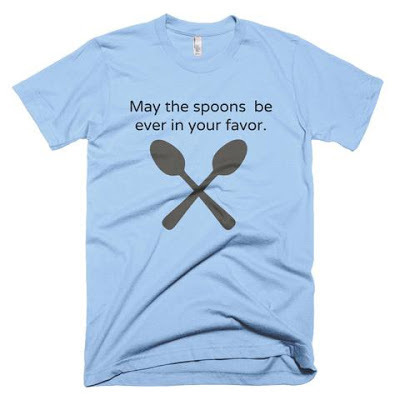Most people live in fear of some terrible event changing their lives, the death of a loved one or a serious illness. For the chronically ill, this terrible event has already happened, and we have been let in on an amazing secret: You survive. You adapt, and your life changes, but in the end you go on, with whatever compromises you have been forced to make, whatever losses you have been forced to endure. You learn to balance your fears with the simple truth that you must go on living.
~Jamie Weisman
For Wellness Wednesday, we have a very helpful theory for understanding what it's like to have a reduced amount of energy due to chronic illness. If someone says that they are saving their spoons for later, do you know what it means?
An excerpt from
The Spoon Theory
by Christine Miserandino
My best friend and I were in the diner, talking. As usual, it was very late and we were eating French fries with gravy. Like normal girls our age, we spent a lot of time in the diner while in college, and most of the time we spent talking about boys, music or trivial things, that seemed very important at the time. We never got serious about anything in particular and spent most of our time laughing.
As I went to take some of my medicine with a snack as I usually did, she watched me with an awkward kind of stare, instead of continuing the conversation. She then asked me out of the blue what it felt like to have Lupus and be sick. I was shocked not only because she asked the random question, but also because I assumed she knew all there was to know about Lupus. She came to doctors with me, she saw me walk with a cane, and throw up in the bathroom. She had seen me cry in pain, what else was there to know?
I started to ramble on about pills, and aches and pains, but she kept pursuing, and didn’t seem satisfied with my answers. I was a little surprised as being my roommate in college and friend for years; I thought she already knew the medical definition of Lupus. Then she looked at me with a face every sick person knows well, the face of pure curiosity about something no one healthy can truly understand. She asked what it felt like, not physically, but what it felt like to be me, to be sick.
As I tried to gain my composure, I glanced around the table for help or guidance, or at least stall for time to think. I was trying to find the right words. How do I answer a question I never was able to answer for myself? How do I explain every detail of every day being effected, and give the emotions a sick person goes through with clarity. I could have given up, cracked a joke like I usually do, and changed the subject, but I remember thinking if I don’t try to explain this, how could I ever expect her to understand. If I can’t explain this to my best friend, how could I explain my world to anyone else? I had to at least try.
At that moment, the spoon theory was born.
Read the rest here
25 Helpful Things to Say to Spoonies
23 Spoonie Hacks That Can Make Life With Chronic Illness Easier


3 comments:
Such a valuable read—I'm glad I took the time. (Thank you for sharing!)
Definitely an illuminating "theory." Meant a lot.
I love that shirt so much.
Post a Comment